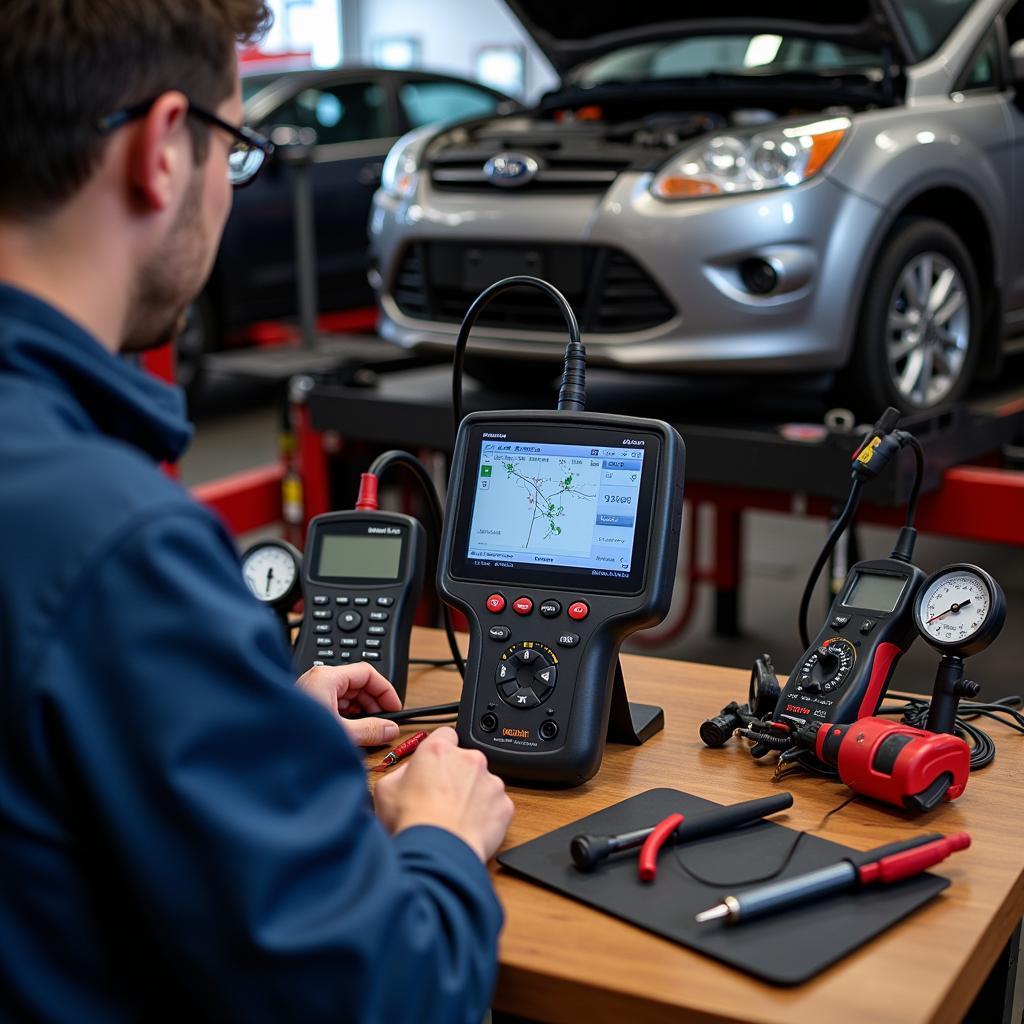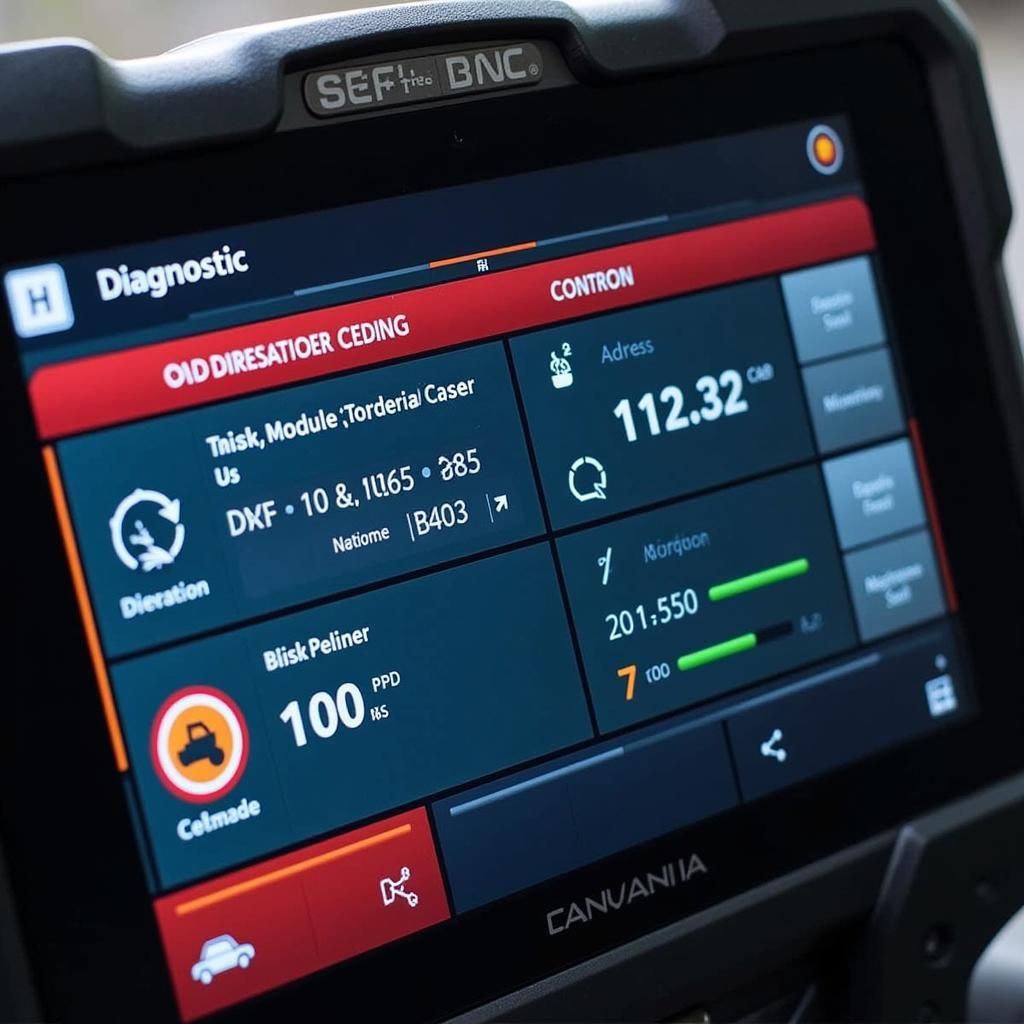Finding the right diagnostics machine for your car repair business or personal garage can be a daunting task, especially with the wide array of options available. Whether you’re a seasoned mechanic or a car enthusiast, having a reliable diagnostics machine is essential for quickly and accurately identifying car problems. This comprehensive guide explores everything you need to know about diagnostics machines for all cars, helping you make an informed decision.
 Top Car Diagnostic Tools
Top Car Diagnostic Tools
What is a Car Diagnostics Machine and Why Do You Need One?
Modern vehicles are complex machines controlled by intricate electronic systems. A car diagnostics machine, also known as a car code reader or scan tool, acts as a window into these systems. It allows you to communicate with your car’s computer, retrieve diagnostic trouble codes (DTCs), and monitor live data streams from various sensors.
Having a diagnostics machine offers several benefits:
- Accurate Problem Diagnosis: Quickly pinpoint the root cause of car problems, saving time and money on unnecessary repairs.
- Enhanced Repair Capabilities: Access detailed information about your car’s systems, enabling you to perform more complex repairs yourself.
- Improved Vehicle Performance: Monitor live data streams to identify potential issues before they escalate into major problems.
- Cost Savings: Avoid expensive trips to the mechanic for simple diagnostics.
Types of Diagnostics Machines: From Basic to Advanced
Diagnostics machines come in various types, each offering a different level of functionality and features:
1. Basic Code Readers:
Ideal for car owners and DIY enthusiasts, these portable devices read and clear basic DTCs. They are generally affordable and easy to use.
2. OBD2 Scanners:
Offering more advanced features than basic code readers, OBD2 scanners provide live data streams, freeze frame data, and more detailed code definitions. They are suitable for both car owners and professional mechanics.
3. Professional-Grade Scan Tools:
Designed for professional mechanics and workshops, these comprehensive tools offer advanced functionalities like bi-directional control, module coding, and access to manufacturer-specific systems.
 Professional Diagnostics Machine Features
Professional Diagnostics Machine Features
Choosing the Right Diagnostics Machine for Your Needs
With so many options available, selecting the right diagnostics machine can feel overwhelming. Here are key factors to consider:
1. Your Skill Level:
Consider your technical expertise and the complexity of repairs you plan to undertake.
2. Vehicle Compatibility:
Ensure the machine is compatible with the make, model, and year of your car or the vehicles you service.
3. Features and Functionality:
Determine the specific features you need, such as live data streaming, bi-directional control, or special functions.
4. Budget:
Set a budget before you start shopping, as prices can vary significantly based on features and capabilities.
5. Software Updates:
Choose a machine that offers regular software updates to ensure compatibility with the latest vehicle models and technologies.
car diagnostic machine for sale in uk
Understanding Diagnostic Trouble Codes (DTCs)
When a car’s onboard computer detects a problem, it generates a DTC, which is stored in its memory. Diagnostics machines retrieve and display these codes, providing clues about the potential source of the issue.
DTCs typically consist of a five-character alphanumeric code, structured as follows:
- First Character: Indicates the system where the fault lies (e.g., P for Powertrain, B for Body, C for Chassis, U for Network).
- Second Character: Specifies whether the code is generic (0) or manufacturer-specific (1).
- Third Character: Identifies the specific system or subsystem affected (e.g., 1 for Fuel and Air Metering, 2 for Fuel and Air Metering – Injector Circuit).
- Fourth and Fifth Characters: Represent the specific fault within the identified system.
Understanding DTCs is crucial for effective diagnostics. However, it’s important to note that codes alone don’t always pinpoint the exact problem. They serve as starting points for further investigation and troubleshooting.
Common Car Problems Diagnosed with a Diagnostics Machine
Diagnostics machines can help identify a wide range of car problems, including:
- Engine Issues: Misfires, poor fuel economy, loss of power.
- Transmission Problems: Slipping gears, rough shifting, transmission failure.
- Brake System Faults: ABS problems, brake light issues, electronic stability control malfunctions.
- Airbag System Malfunctions: Airbag warning lights, faulty sensors.
- Emission Control System Problems: Check engine light illumination, oxygen sensor failures.
The Future of Car Diagnostics: Embracing Technology
The field of car diagnostics is constantly evolving, with new technologies emerging to enhance accuracy and efficiency.
- Cloud-Based Diagnostics: Cloud-based platforms allow for remote diagnostics, data sharing, and access to vast databases of repair information.
- Artificial Intelligence (AI): AI-powered diagnostics systems can analyze vast amounts of data to predict potential problems and suggest preventative maintenance.
- Augmented Reality (AR): AR overlays digital information onto the real world, providing mechanics with real-time guidance and schematics during repairs.
Conclusion
Investing in a reliable diagnostics machine is essential for car owners and professional mechanics alike. By understanding the different types, features, and functionalities available, you can choose the right tool to meet your specific needs and budget. As technology continues to advance, we can expect even more sophisticated and powerful diagnostics solutions in the future, making car repair faster, more accurate, and more efficient.
FAQs:
-
Can I use a diagnostics machine on any car?
- Not all diagnostics machines are universally compatible. Ensure the machine supports the specific make, model, and year of your car.
-
Do I need a professional-grade diagnostics machine?
- If you’re a car enthusiast or DIYer, a basic code reader or OBD2 scanner may suffice. Professional mechanics typically require more advanced tools.
-
Can a diagnostics machine fix my car problems?
- Diagnostics machines primarily diagnose problems. While some offer bi-directional control for specific functions, they don’t inherently fix issues.
-
Where can I buy a diagnostics machine?
- Diagnostics machines are available from various retailers, including auto parts stores, online retailers, and specialized tool suppliers.
-
How often should I use a diagnostics machine?
- It’s recommended to scan your car for codes periodically or whenever you experience car trouble.
Need further assistance with car diagnostics?
Contact our expert team via WhatsApp: +1(641)206-8880, or email us at [email protected]. Our 24/7 customer support is here to help!

Leave a Reply